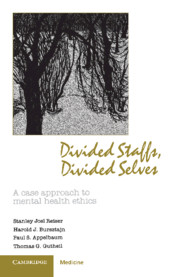Book contents
- Frontmatter
- Contents
- Acknowledgments
- About the authors
- 1 Introduction
- 2 New problems, new ethics: challenging the value structure of health care
- 3 Conflict and synthesis: the comparative anatomy of ethical and clinical decision making
- 4 Solving clinical puzzles: strategies for organizing mental health ethics rounds
- CASES IN MENTAL HEALTH ETHICS
- I Informed consent, competency, and involuntary treatment
- II Confidentiality
- III Truth-telling
- IV Managing difficult patients
- V Parents and children
- VI Religion and mental health treatment
- VII Allocation of resources
- VIII Research
- IX Mental health and medical illness
- X Mental health and criminal justice
- Bibliography
- Index
IV - Managing difficult patients
from CASES IN MENTAL HEALTH ETHICS
Published online by Cambridge University Press: 06 July 2010
- Frontmatter
- Contents
- Acknowledgments
- About the authors
- 1 Introduction
- 2 New problems, new ethics: challenging the value structure of health care
- 3 Conflict and synthesis: the comparative anatomy of ethical and clinical decision making
- 4 Solving clinical puzzles: strategies for organizing mental health ethics rounds
- CASES IN MENTAL HEALTH ETHICS
- I Informed consent, competency, and involuntary treatment
- II Confidentiality
- III Truth-telling
- IV Managing difficult patients
- V Parents and children
- VI Religion and mental health treatment
- VII Allocation of resources
- VIII Research
- IX Mental health and medical illness
- X Mental health and criminal justice
- Bibliography
- Index
Summary
HELPING AND HATING
How, ethically, should the intense dislike of a patient by staff be handled?
The patient is a male in his mid-3os whose diagnosis is uncertain. The primary possibilities are chronic manic-depressive illness or schizoaffective disorder. The brilliance of his childhood is reflected in his being able to play the piano at age three. Doted on by his mother, he was the star of his family and was frequently shown off. He had his first psychotic break at the age of 15 while in private school, apparently over the stresses of sexual maturation and various identity issues. He had a number of treatments with electroconvulsive therapy and hospitalizations over a period of several years during which he never achieved independent living.
Ten years prior to the present admission the patient's sister and her husband brought the patient to a different city in an effort to rehabilitate him. He did reasonably well on a new medication and remained out of the hospital until this admission.
The patient's inpatient contact is characterized by numerous medical problems, a profound tendency toward serious regression in the hospital, and a serious inability to use the hospital in any constructive way. He is very demanding, frequently expressing anger toward staff and getting into struggles with the staff over medications, restrictions, and the like.
After 3 months in the hospital, he is discharged at his insistence, but brought back involuntarily only a week later for threatening a fellow resident at the halfway house.
- Type
- Chapter
- Information
- Divided Staffs, Divided SelvesA Case Approach to Mental Health Ethics, pp. 87 - 94Publisher: Cambridge University PressPrint publication year: 1987



